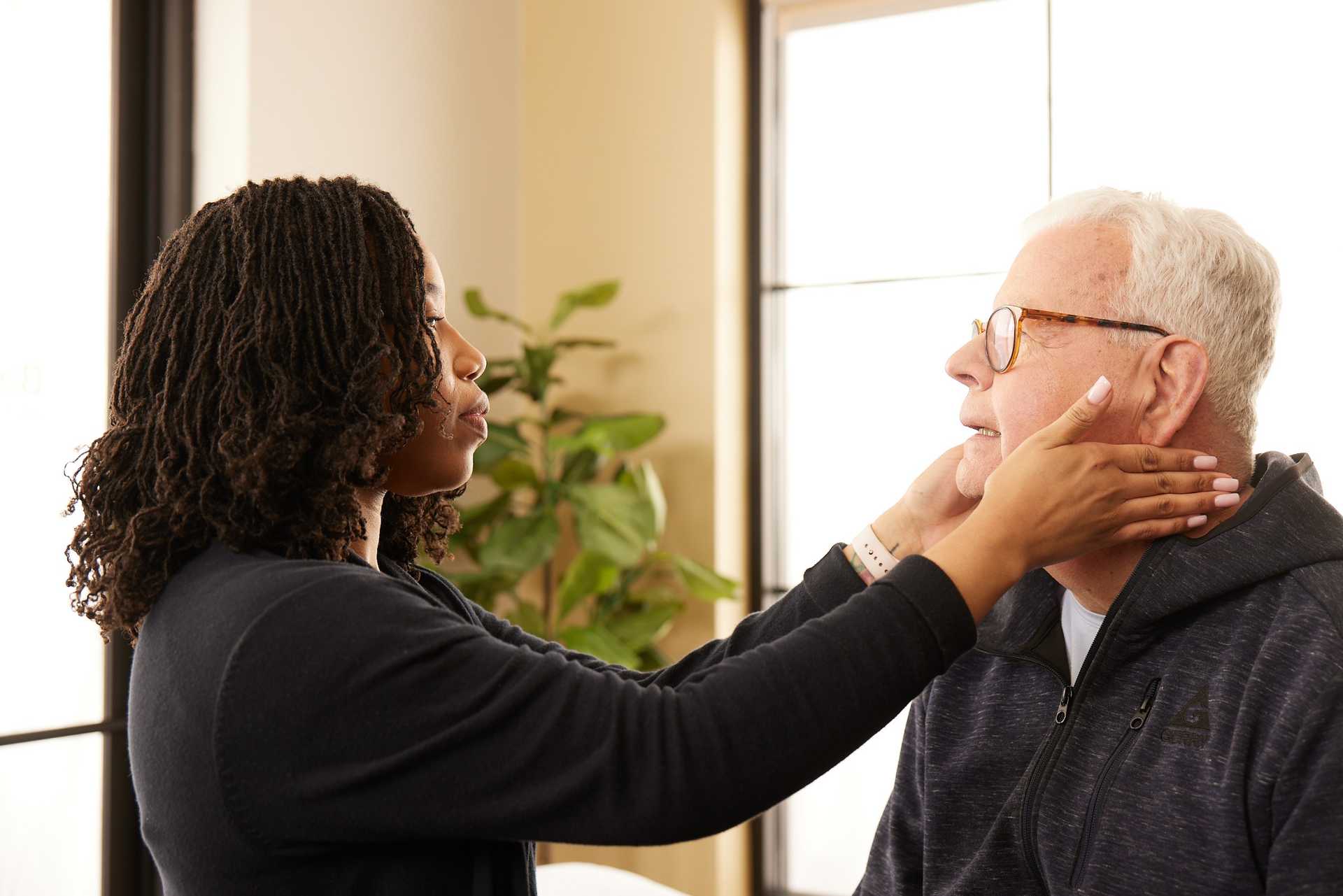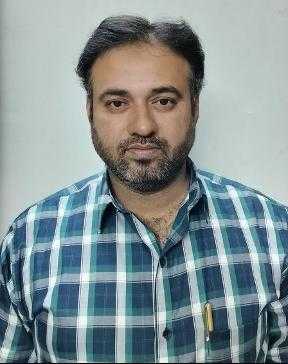
Expert Physiotherapy at Home
Certified physiotherapists visit you at home to provide focused, one-on-one care tailored to your needs. With no travel or waiting rooms, recovery happens in a setting that is comfortable, familiar, and built around your convenience.
Personalised Recovery Programmes
Every treatment plan is designed to suit your condition, goals, and pace. Our physiotherapists follow structured, evolving protocols to ensure consistent progress, with each session aligned to deliver meaningful results.
Trusted Physiotherapists. Real Results.
Our team comprises experienced, background-verified physiotherapists trusted by thousands of families. With a strong focus on safety, reliability, and clinical outcomes, we make recovery at home both effective and reassuring
Patient Testimonials
Portea Physiotherapists for Home Visits
Meet some of our experienced and dedicated healthcare professionals

Dr. Lokesh G
Physiotherapist
Specializations
Experienced in Neurological rehabilitation, Orthopaedic physiotherapy, and Paediatric care
Delivers structured, high-impact treatment plans across neuro, ortho, and paediatrics—ensuring safety, comfort, and measurable recovery at every stage.

Dr. Mohammed Sarwar
Physiotherapist
Specializations
Experienced in Neurological rehabilitation, Adult physiotherapy, and Paediatric care
Combines deep clinical expertise with a compassionate approach, supporting both adults and children through neuro and physical rehabilitation that promotes long-term independence and recovery.

Dr. Nelapati Divya
Physiotherapist
Specializations
Skilled in Orthopaedic rehabilitation, Manual therapy techniques, and Paediatric physiotherapy
Brings a personalised, hands-on approach to healing—combining structural expertise with paediatric sensitivity to restore movement, relieve pain, and improve everyday function.

Dr. Naveen V
Physiotherapist
Specializations
Trained in Pain management, Cardiac and Orthopaedic rehabilitation, Neurological care, and Neural tissue mobilisation
Brings clinical precision and empathy together—designing science-backed recovery protocols for pain relief, nerve mobilisation, and cardio-neuro-ortho rehabilitation across all age groups

Dr. Miloni Savla
Physiotherapist
Specializations
Holds an MPT in Orthopaedics with a focus on Musculoskeletal rehabilitation and strength recovery
Delivers focused, movement-oriented therapy grounded in orthopaedic science—helping patients rebuild strength, restore function, and return to daily life with confidence
Other Cities
Physiotherapy Treatments

introduction
The temporomandibular joint (TMJ) plays a crucial role in jaw movement, enabling essential functions such as chewing, speaking, and yawning. Dysfunction in this joint, known as temporomandibular disorder (TMD), can cause pain, stiffness, and difficulty in jaw movement. TMJ rehabilitation focuses on restoring function, reducing pain, and improving the quality of life for individuals affected by TMD.
understanding tmj disorders (tmd)
TMJ disorders can arise from various factors, including:
- Muscle tension and overuse: Excessive chewing, nail-biting, or clenching the jaw can strain TMJ muscles.
- Jaw misalignment: Structural issues can disrupt normal jaw function.
- Trauma or injury: Accidents or blows to the jaw can lead to TMD.
- Arthritis: Conditions like osteoarthritis or rheumatoid arthritis can affect TMJ health.
- Stress-related habits: Teeth grinding (bruxism) and clenching contribute to TMJ strain.
common symptoms of tmd
- Jaw pain and tenderness: Often felt around the TMJ, extending to the ears and neck.
- Clicking or popping sounds: Audible noises during jaw movement, sometimes accompanied by discomfort.
- Difficulty chewing: Stiffness or pain while eating or talking.
- Locking of the jaw: Inability to open or close the mouth fully.
- Headaches and ear pain: TMJ dysfunction can cause tension headaches and a sensation of ear fullness.
diagnosis of tmj disorders
A thorough evaluation by a healthcare professional is necessary for accurate diagnosis. Common diagnostic methods include:
- Physical examination: Assessing jaw movement, muscle tenderness, and joint function.
- Imaging tests: X-rays, MRIs, or CT scans help identify structural abnormalities.
- Bite analysis: Evaluating occlusion and jaw alignment.
non-surgical tmj rehabilitation approaches
Most cases of TMJ disorders can be managed with conservative treatments, focusing on pain relief and restoring function.
1. Physiotherapy for TMJ Rehabilitation
Physiotherapy plays a vital role in TMD management, incorporating:
- Stretching and strengthening exercises: To improve jaw mobility and muscle strength.
- Manual therapy: Soft tissue massage and joint mobilization reduce pain and stiffness.
- Postural training: Correcting head and neck posture minimizes strain on the TMJ.
- Ultrasound therapy: Reduces inflammation and enhances blood circulation.
2. Lifestyle and Habit Modifications
- Avoiding hard or chewy foods: Opt for softer foods to reduce strain on the TMJ.
- Breaking bad habits: Stop nail-biting, gum chewing, and teeth clenching.
- Stress management techniques: Meditation, breathing exercises, and relaxation strategies help reduce jaw tension.
3. Pain Management Techniques
- Hot and cold therapy: Applying heat relaxes muscles, while ice packs reduce inflammation.
- Over-the-counter pain relievers: NSAIDs like ibuprofen help manage discomfort.
- Muscle relaxants: Prescribed for severe muscle spasms.
advanced treatment options
If conservative approaches fail, advanced interventions may be required.
1. Dental and Orthodontic Solutions
- Mouthguards or splints: Help reduce teeth grinding and jaw clenching.
- Dental corrections: Addressing bite misalignment through orthodontic treatments.
2. Medical Interventions
- Botox injections: Temporarily relax overactive jaw muscles.
- Corticosteroid injections: Reduce inflammation in severe cases.
3. Surgical Procedures
Surgery is considered a last resort for persistent TMJ disorders. Options include:
- Arthrocentesis: Minimally invasive fluid injection to clear joint debris.
- TMJ arthroscopy: Using a small camera to perform joint repairs.
- Open-joint surgery: Necessary for severe structural damage or arthritis.
preventive strategies for tmj disorders
- Maintaining good posture: Avoid slouching to reduce neck and jaw strain.
- Using proper ergonomics: Keeping screens at eye level prevents jaw misalignment.
- Regular jaw exercises: Gentle stretching and relaxation techniques enhance flexibility.
- Avoiding excessive jaw movements: Limiting yawning and wide mouth openings.
how portea supports tmj rehabilitation
At Portea, we offer specialized home-based physiotherapy services tailored for TMJ rehabilitation. Our experienced physiotherapists provide personalized care, focusing on pain relief, mobility improvement, and long-term recovery strategies.
Beyond TMJ rehabilitation, Portea provides a range of physiotherapy services, including post-surgical rehabilitation, arthritis care, neuro-rehabilitation, sports injury recovery, orthopedic care, elderly physiotherapy, and respiratory therapy. With a commitment to patient-centered care, we help individuals regain function and lead pain-free lives in the comfort of their homes.
faqs
1.Who needs TMJ rehabilitation?
People with jaw pain, difficulty chewing, clicking sounds, or limited movement due to TMJ disorders benefit from rehabilitation, which helps restore function, ease discomfort, and improve overall jaw health through targeted exercises and therapy.
2.What treatments are used in TMJ rehabilitation?
Treatments include jaw exercises, posture correction, pain management techniques, lifestyle modifications, and in some cases, physical therapy or dental interventions to improve joint function and relieve discomfort.
3.How long does TMJ rehabilitation take?
Recovery time varies based on severity. Some individuals experience relief within weeks, while others may require months of consistent therapy, exercises, and professional guidance to achieve long-term improvements in jaw function.
4.Can TMJ disorders be cured permanently?
Some cases improve with therapy and lifestyle changes, but chronic conditions may require ongoing management. Early treatment, proper posture, stress reduction, and jaw exercises can help prevent recurring issues and improve overall function.
5.Are there home exercises for TMJ relief?
Yes, gentle jaw stretches, relaxation techniques, massage, and strengthening exercises can relieve tension, reduce pain, and enhance mobility. Consistently practicing these exercises helps improve joint function and prevent discomfort from worsening.
Doctor Consultation
Nursing
Physiotherapy
Trained Attendant
Elder Care
Mother & Baby Care
Lab Tests
Medical Equipment
Speciality Pharma
Critical Care




